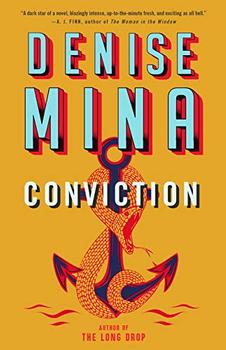Summary | Excerpt | Reviews | Beyond the Book | Read-Alikes | Genres & Themes | Author Bio

This article relates to Conviction
 The action in Denise Mina's novel Conviction is set in motion when the protagonist listens to a true-crime podcast.
The action in Denise Mina's novel Conviction is set in motion when the protagonist listens to a true-crime podcast.
Serial audio broadcasts have existed for more than a century; many of us remember gathering around our radios each week to listen to favorite shows, or remember parents or grandparents doing so. In many ways listening to podcasts is a similar experience – they're basically audio shows which can be downloaded to portable devices and be heard on-demand.
The idea first arose at a meeting in 2000 between MTV video jockey Adam Curry and his friend Dave Winer. Curry was looking for a way to distribute video across the Internet but Winer dissuaded him; at the time (pre-broadband) it would take longer to download a video clip than to watch it, and even then, the quality would be poor. Curry also wanted to have the ability to subscribe to content and have it be automatically downloaded. They decided the process needed three elements: software to create content, software to read the content, and a way to search for content. Each worked on all three aspects of the problem, but a breakthrough occurred in 2004 when Curry created a simple AppleScript program that would download internet radio broadcasts to his iPod (hence the name "podcast"). The technology immediately took off within the Open Source programming community, with multiple developers improving all aspects of podcasting over the ensuing years.
The first true podcast was launched by Curry in 2004. Called Daily Source Code, content was aimed at software coders and included discussions about the development of this new technology. (The last episode of Daily Source Code was released in November 2019, but Curry hosts another podcast centered around discussing media and politics called No Agenda.) Podcasting made another leap forward when Apple's iTunes added support for the format in 2005, giving listeners an easy way to enjoy podcasts.
Currently podcasts are free from government regulation; you don't need to buy a license to broadcast, nor do you need to conform to the FCC's decency standards. This has resulted in a vast array of content of mixed quality, since anyone with a smart device, a microphone and an internet connection can create a podcast. Podcasts may be created to entertain, broadcast news and opinions, educate and train…as well as pretty much any other use you can think of. Most broadcasters are amateur, but many large corporations (GM, Heineken) and commercial media (NPR, iHeartRadio) have started to develop their own shows, or repurpose existing content, in response to podcasts' growing popularity with the public.
All modern smartphones and computers come with the built-in ability to download and play podcasts, and there are many apps out there as well (some free, some not). Smart speakers such as Amazon's Alexa and Google Home can be set up to download and play podcasts as well. Many people find content based on recommendations from others, and there are also podcasts available for free from Google and Apple, right from their app stores. While most podcasts remain available without a fee, recently subscription services have begun to appear, offering premium content to listeners for a small monthly fee.
As of April 2020, it's estimated that there are over 850,000 shows, which combined have produced over 30 million episodes available for download. According to Edison Research and Trident Digital's Infinite Dial 2020 report, large segments of the American population are familiar with podcasts. Some interesting statistics include:
Photo of podcast equipment, courtesy of Public Domain Pictures
Filed under Cultural Curiosities
![]() This "beyond the book article" relates to Conviction. It originally ran in July 2019 and has been updated for the
April 2020 paperback edition.
Go to magazine.
This "beyond the book article" relates to Conviction. It originally ran in July 2019 and has been updated for the
April 2020 paperback edition.
Go to magazine.
Your guide toexceptional books
BookBrowse seeks out and recommends the best in contemporary fiction and nonfiction—books that not only engage and entertain but also deepen our understanding of ourselves and the world around us.